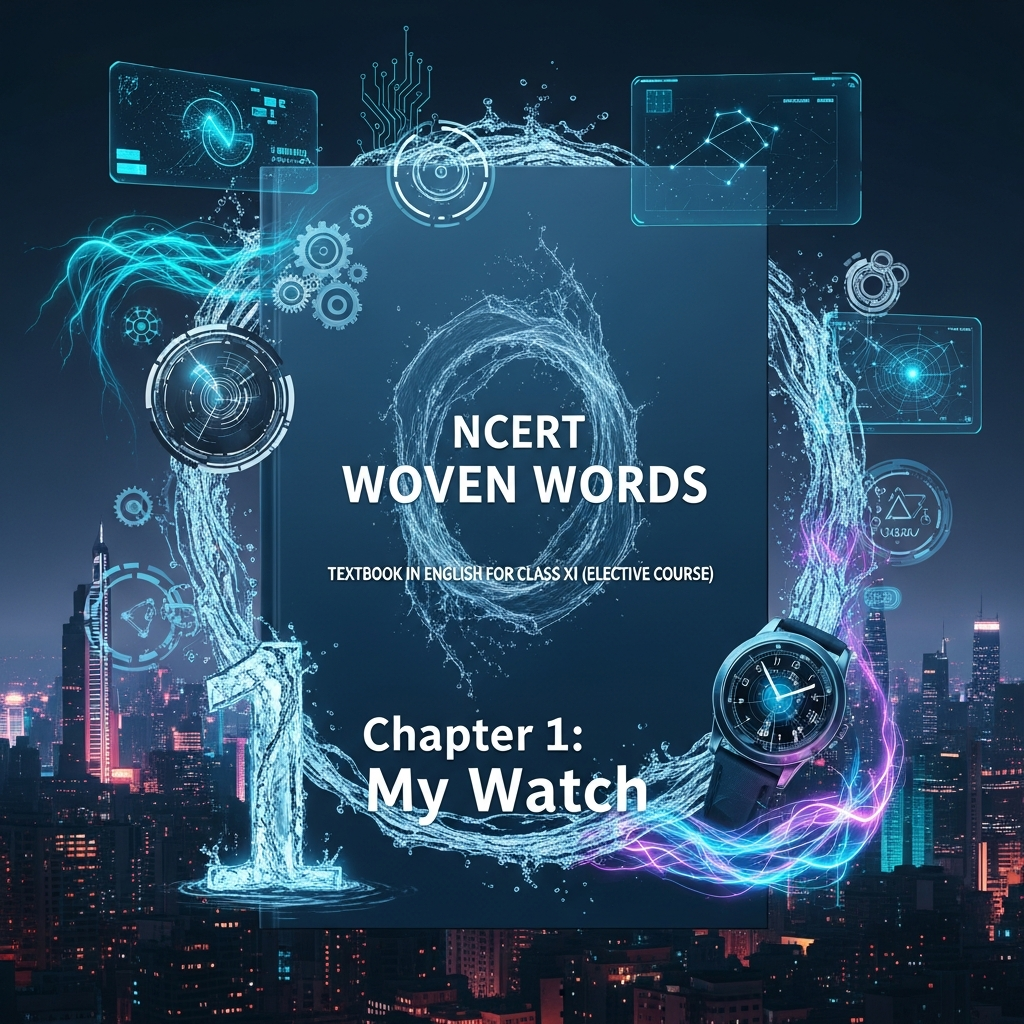Complete Summary and Solutions for My Watch – NCERT Class XI English Woven Words, Essay Section, Chapter 1 – Explanation, Analysis, Questions, Answers
Detailed summary and explanation of Chapter 1 'My Watch' by Mark Twain from the Woven Words English textbook essay section for Class XI (Elective Course), including humor, themes, narrative style, and all NCERT questions, answers, and comprehension exercises.
Updated: 2 months ago

My Watch
Mark Twain | Woven Words Essays - Ultimate Study Guide 2025
Introduction to Essays - Woven Words
An essay is a short composition in prose that undertakes to discuss a matter, express a point of view, or persuade us to accept an idea on any subject. It is addressed to a general rather than a specialised audience; as a consequence, the essay discusses its subject in a non-technical fashion and often with a liberal use of anecdote, illustration and humour.
A useful distinction is that between the formal and informal essay. The formal essay is relatively impersonal, logically organised and filled with serious purpose. The informal essay is personal, written in a relaxed, often whimsical fashion, and tends to deal with everyday things.
Essays have been written since ancient times. The French writer, Montaigne, wrote short literary pieces which he called Essaies, meaning ‘attempts’. Francis Bacon inaugurated the English use of the term in his own essays. The founding of literary periodicals and magazines gave great impetus to the writing of essays (earlier essays were published in books).
The essays in this unit provide a wide thematic range. My Watch is a humorous re-look at an instrument that most of us take for granted. My Three Passions focuses on the eternal concepts of love and pity. Tribal Verse makes one sensitively aware of the rich oral literatures of India. Bridges, an autobiographical excerpt, gives us a glimpse into the life of a kathak dancer and choreographer while Patterns of Creativity throws light on the creativity of poetry and creativity of science.
Key Elements
- Forms: Formal (impersonal, logical) vs. Informal (personal, whimsical).
- Devices: Anecdote, illustration, humour for engagement.
- Themes: Everyday objects, human folly, satire on repairmen.
- Economy: Concise prose transforms mundane into insightful commentary.
Reprint 2025-26
Author: Mark Twain (1835–1910)
Samuel L. Clemens (1835–1910), who used the pseudonym Mark Twain, was an American humorist, short story writer and novelist. Brought up in the small town of Hannibal, Missouri, Mark Twain had less than 10 years of schooling. He worked as a printer’s apprentice, a steamboat pilot, a prospector and a journalist. All this gave him varied experiences and a wide knowledge of humanity.
In The Adventures of Tom Sawyer, he drew on his own childhood; The Adventures of Huckleberry Finn, which was planned merely as a sequel, went on to become a masterpiece, the story being narrated through an uneducated boy.
His essays, like My Watch, showcase his signature wit and satire, poking fun at human absurdities through exaggerated anecdotes.
Major Works
- The Adventures of Tom Sawyer (1876), The Adventures of Huckleberry Finn (1884)
- Essays: The Innocents Abroad, Life on the Mississippi
Key Themes
- Human folly and hypocrisy
- American life, adventure, satire
- Everyday objects as metaphors for chaos
Style
Conversational, hyperbolic; blends humor with sharp social commentary in informal prose.
Reprint 2025-26
Full Essay Text: My Watch
Reprint 2025-26
Essay Summary: English & Hindi (Detailed Overview)
English Summary (Approx. 1 Page)
Mark Twain narrates the comical downfall of his once-perfect watch, which ran flawlessly for 18 months until a jeweler's meddling sets off a chain of absurd malfunctions. Initially gaining wildly—racing ahead by 13 days—the watch is "repaired" multiple times, each fix worsening its woes: slowing to lag behind the world, erratic speeding and stopping, hands fusing like scissors, or buzzing like a bee before halting abruptly.
Through hyperbolic anecdotes, Twain satirizes incompetent repairmen, from the "human cabbage" jeweler to a steamboat engineer-turned-watchmaker who prescribes a "monkey-wrench on the safety-valve." Exasperated, the narrator imagines violence, echoing Uncle William's wisdom: good things ruin after "tinkers" meddle. The essay humorously laments how experts destroy what works, turning a reliable timepiece into a chaotic joke on human overconfidence.
हिंदी सारांश (संक्षिप्त)
मार्क ट्वेन अपनी परफेक्ट घड़ी की हास्यपूर्ण कहानी सुनाते हैं, जो 18 महीने बिना रुके चली, लेकिन ज्वेलर की छेड़छाड़ से बिगड़ जाती है। पहले तेज़ भागती है—13 दिन आगे—फिर कई मरम्मतों से धीमी, रुक-रुक कर चलती, या तेज़ घूमकर रुक जाती।
अक्षम मरम्मतकर्ताओं पर व्यंग्य: "ह्यूमन कैबेज" ज्वेलर से भाप इंजीनियर तक, जो "सेफ्टी वाल्व पर मंकी रिंच" सुझाते हैं। चाचा विलियम का कथन: अच्छी चीज़ें "टिंकर्स" से बिगड़ जातीं। निबंध विशेषज्ञों की घमंड पर हास्यपूर्ण टिप्पणी है।
Reprint 2025-26
Structure & Analysis: Key Parts & Devices
Overview
The essay divides into two parts: I chronicles the watch's escalating chaos post-initial repair; II details successive fixes, culminating in satirical climax. Twain's informal style uses hyperbole and anthropomorphism for humor.
Structure in Phases
- Exposition: Perfect watch runs down; first meddling (Part I opening).
- Rising Action: Gaining frenzy, cleaning/oiling backfire, barrel swell (Part I).
- Climax: Final engineer's absurd verdict (Part II).
- Resolution: Uncle's wisdom; reflection on tinkers.
Points to Ponder
- Imagery: Watch as "raging fever," "buzz like a bee"—humanizes malfunction.
- Narrative Voice: First-person exaggeration builds absurdity.
- Satire: Targets "experts" who overcomplicate simplicity.
Tip: Note progression from trust to despair—mirrors life's ironic disruptions.
Understanding the Essay
1. What was the importance of the watch to the author?
- The watch symbolized reliability and permanence; after 18 flawless months, it became "infallible" in the author's eyes, its "constitution and anatomy imperishable."
- Running down evoked calamity, a "messenger and forerunner," highlighting emotional attachment to its precision amid life's uncertainties.
- This anthropomorphic bond underscores the essay's theme: over-trust in objects leads to humorous downfall.
2. What were the attempts made by the author to get his watch repaired?
- First: Jeweler pushes regulator, causing gain; later cleaning/oiling slows it drastically.
- Second: Watchmaker fixes "swelled" barrel—leads to erratic half-day speeds.
- Third: Repairs "broken king-bolt"—results in intermittent stopping/kicking.
- Fourth: Fixes "fresh start," bent crystal, mainspring—causes buzzing spins.
- Fifth: Steamboat engineer suggests "monkey-wrench on safety-valve," prompting imagined violence.
3. Why did the author finally give up on his watch?
- Repeated "repairs" escalated chaos: from gaining 13 days to lagging weeks, erratic behaviors like fused hands or rapid reeling.
- Cost ballooned from $200 to thousands; final absurd diagnosis confirmed repairmen's incompetence.
- Uncle William's adage resonated: once tinkered, perfection lost—author accepts ironic ruin over futile fixes.
4. What was Uncle William’s comment on the ‘tinkerers’ of the world?
- "A good horse was a good horse until it had run away once, and that a good watch was a good watch until the repairers got a chance at it."
- He wondered about "unsuccessful tinkers, gunsmiths, shoe-makers, engineers, blacksmiths"—implying they vanish, leaving ruin.
- Satirizes meddlers who destroy functionality under guise of expertise.
5. Explain these lines
After slowing to "linger in week before last," author feels isolated like a museum mummy—out of time, yearning outdated "news," humorously equating watch woes to eternal stagnation.
b. ‘Within a week it sickened to a raging fever and its pulse went up to a hundred and fifty in the shade.’Anthropomorphizes wild gaining: "fever" for overheating speed, "pulse" (ticks) at 150/min—exaggerates malfunction as illness, building comedic frenzy.
c. ‘She makes too much steam—you want to hang the monkey wrench on the safety valve!’Final repairman's mechanical metaphor misapplies steam-engine fix to watch, satirizing ignorant "experts"; prompts violent fantasy, climaxing absurdity.
Talking about the Essay - Discussion Prompts
Discuss in pairs or groups of four
1. Replacing old machines with new is better than getting them repaired.
- Twain's tale warns of "tinkers"—explore: Modern parallels like phone repairs vs. upgrades?
- Pros/cons: Sentiment vs. efficiency; does nostalgia justify chaos?
- Personal: Share repair horror stories—do they echo Twain's satire?
2. It is difficult to part with personal items like a watch which have a sentimental value attached to them.
- Author's grief at rundown shows attachment—discuss: Why do objects gain "personality"?
- Cultural: Heirlooms in families; Twain's hyperbole amplifies universal reluctance.
- Extension: If watch fixed perfectly, would bond strengthen or fade?
Appreciation & Analysis
1. How is humour employed to comment on the pains that the author took to get his watch set right?
- Hyperbole ("danced around in anguish," "brained him") exaggerates frustration, turning agony into farce.
- Anthropomorphism (watch "sickened," "barking") humanizes chaos, inviting laughter at shared folly.
- Satire on experts softens "pains" via irony—readers chuckle at escalating absurdity, empathizing without pity.
2. ‘The author’s treatment of the subject matter makes the readers identify themselves with the experience.’ Comment on this statement.
- Relatable premise: Everyday trust in gadgets betrayed by "helpers"—evokes universal repair woes.
- First-person candor ("no idea what king-bolt was") mirrors self-deprecating admissions, fostering kinship.
- Climactic violence fantasy cathartic; readers nod at Uncle's wisdom, seeing own "tinker" encounters.
3. Identify some of the improbable images the author has used to effect greater humour.
- Watch "enjoying snow in November" while leaves turn—temporal dislocation absurdly vivid.
- Hands as "scissors" or "spider’s web"—mechanical whimsy defies logic, amplifying frenzy.
- "Kick back like a musket," "buzz like a bee"—equates tiny gears to weapons/insects, heightening comedic scale.
Language Work
Expressions that Imbue the Watch with Human Attributes
- "Run down" (fatigue), "grieved about it" (emotional loss).
- "Sickened to a raging fever," "pulse went up" (illness).
- "Barking and wheezing and whooping" (noises like human coughs).
- "Kicked back like a musket" (rebellious action).
- "Makes too much steam" (overexertion).
Word Associations
| Human Folly | Watch Malfunctions | Humorous Exaggeration |
|---|---|---|
| tinkers, human cabbage | gaining, slowing, buzzing | raging fever, spider’s web |
Interactive Quiz - Test Your Understanding
10 MCQs on essay, themes, and devices. Aim for 80%+.
Suggested Reading
- The Adventures of Huckleberry Finn by Mark Twain
- The Mysterious Stranger and Other Stories by Mark Twain
Reprint 2025-26

Group Discussions
No forum posts available.
Easily Share with Your Tribe


